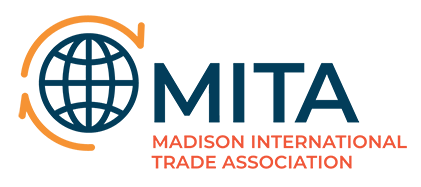The head of global markets for Sartori Cheese sees great potential for expanding product exports, despite certain trade barriers and distribution issues.
“Cheese demand is there and it’s growing, and continues to be growing significantly,” said Sam Allison, global markets manager for the Plymouth-based cheese producer. He spoke during a webinar hosted by the Madison International Trade Association.
He noted U.S. milk production has been growing in recent years and is now outpacing domestic demand, with over 75 percent of the country’s milk production growth in 2020 going toward exports. As worldwide demand also continues to rise, Allison said the United States’ top two competitors for cheese production — the European Union and New Zealand — are “running into challenges” with increasing their production levels.
“There’s a lot of opportunity out there,” Allison said.
Sartori Cheese is a fourth-generation family-owned company that’s been making cheese since 1939, with facilities in Plymouth and Antigo. The company has developed relationships with local dairy farms, most of which are within 50 miles of their production facilities. Allison explained that using fresh milk in the production process is critical for making good cheese.
He said global exports support a big part of the company’s growth, and retail exports are largely focused on Canada and Europe, followed by Mexico, Australia and China.
“There’s a wide variety of specialty cheese understanding and development in those markets,” he said.
Still, he highlighted trade barriers standing in the way of expanding exports to these countries, including supply chain problems hindering distribution on a global scale. He also explained that exclusive regional product names, or “protected geographical indicators,” can create issues for exporters. For example, parmesan cheese is a generic name, while the name Parmigiano-Reggiano is restricted to the regions of Italy where the cheese was traditionally produced.
“It’s an ongoing non-tariff barrier that we run into, as the Europeans work very hard to build [geographical indicator] protections into the trade agreements that they make around the world, so that only Italian producers can sell parmesan to those markets,” he said. “Then they end up missing out on the great parmesan that comes from our facilities here in Wisconsin.”
Over the past decade or so, Allison noted perceptions of U.S. cheeses among European consumers have been improving. Market research has found that opinions have shifted dramatically for the better, he said.
But while Wisconsin enjoys a strong reputation for cheesemaking quality within the United States, Allison explains that many buyers around the world don’t associate Wisconsin with cheese at all, which can pose a challenge.
“It’s a big mystery, and that’s really important for cheese producers. When you’re selling a specialty product, the romance, the origin story — all of those things are a big part of the experience for the consumer,” he said. “Being able to share that is critical.”
He also touched on the pitfalls of getting pulled into discussions on American national politics while selling U.S. products, noting “it can be very polarizing.”
“It’s very easy when you’re overseas to get yourself trapped into a conversation about Mr. Trump or Mr. Biden. When you’re trying to sell cheese, that’s the last thing that you want to do,” he said. “We’ve really tried to focus on Wisconsin, and telling that story, because I think it’s something that’s a huge, huge opportunity.”
See the Harley-Davidson statement.




